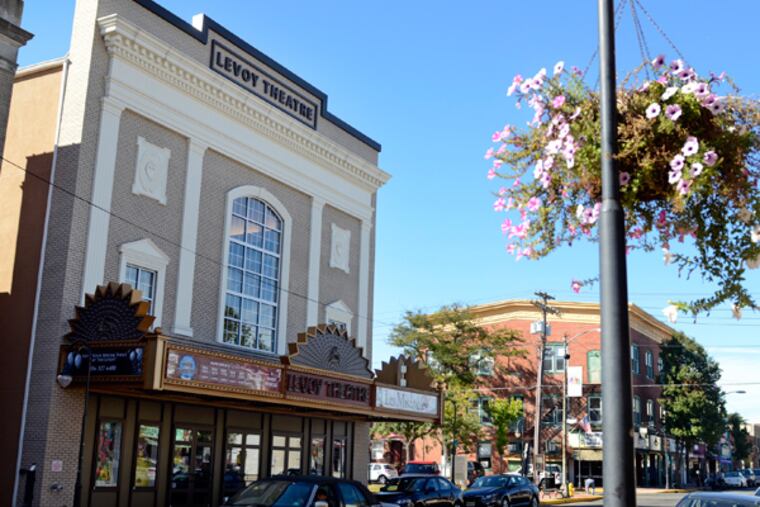Reborn Levoy Theatre at center stage in Millville redevelopment
There have been many incarnations of and near-deaths for the storied Levoy Theatre in Millville, Cumberland County, from vaudeville emporium, silent-film house, talkie movie palace, eventually to boarded-up old wreck.

There have been many incarnations of and near-deaths for the storied Levoy Theatre in Millville, Cumberland County, from vaudeville emporium, silent-film house, talkie movie palace, eventually to boarded-up old wreck.
And it collapsed into a pile of rubble during an initial renovation in 2010 before being miraculously reborn into the sweet little jewel-box that has recently dominated efforts to redevelop Millville from beleaguered glass-factory town into a trendy arts district.
This month, the 105-year-old Levoy (pronounced "LEE-voy" if you're from around there, "la-VOY" if you're not) celebrated the first anniversary of its reopening after an extensive renovation - make that rebuild, after that collapse - and an ambitious inaugural-year schedule that included top entertainers such as comedian Tracy Morgan and singer songwriter Joan Osborne.
With names like Morgan and Osborne and Southside Johnny and the Asbury Jukes on the marquee and a variety of artsy but down-home attractions - including a children's summer theater camp and a film about horseshoe crabs - the theater has had a remarkable initial year, with 15 sold-out shows, said Vincent Bianca, its director of operations.
About 30,000 people have bought the reasonably priced tickets (ranging from about $20 to $39) for the shows, which have also included country acts, classical orchestras, big bands, silent movies, and local theater productions of Les Miserables and Fiddler on the Roof. Coming events include a performance by Last Comic Standing winner Josh Blue, British acoustic folk-rock artist Richard Thompson, and a full lineup of holiday musical presentations.
"I think people who may not have ever come to Millville have had the chance to acquire an appreciation for the town and for this theater, which presents such diverse programming on a regular basis," Bianca said. "There is something for everyone."
The nonprofit operates with a small staff and a 75-member volunteer corps that does everything from sell tickets to escort patrons to their seats, and it subsists on private donations and scant public arts funding.
The preservation of the 696-seat theater cost $9 million and began in the late 1990s. After its original benefactor, Joey Pierce Jr., drowned saving a child in Union Lake, the effort was eventually headed by the father-daughter team of local lawyers Philip and Laura Van Embden. The Van Embdens, members of a longtime Millville family, worked with a team of local volunteers to raise money to save the dilapidated, vacant building.
"When manufacturing dwindled and died out here, Millville was up against some tremendous odds of surviving and needed to reinvent . . . to recast itself in a new light," Philip Van Embden said.
"I think the Levoy is the embodiment of that struggle. It shows us where we've been as a town, preserving a unique part of our past, while creating something new in this spot."
The Levoy is among a number of revived theaters throughout New Jersey that have offered communities a focal point for redevelopment, said Peter Reinhart, professor and director of the Kislak Real Estate Institute at Monmouth University.
Some efforts, such as the Count Basie Theatre in Red Bank, have been widely applauded, Reinhart said.
Others in South Jersey have met with varying degrees of success. Four years ago, the circa-1914 Eagle Theatre in Hammonton became a well-received nonprofit performing arts center in the Atlantic County town's downtown, offering at least a half-dozen theatrical productions a year. In Vineland, the art deco-era Landis Theater opened five years ago, touted as a major cornerstone for redevelopment of the town's main street, but it is on the brink of closing due to management woes, according to city officials. And in Haddon Township, officials began during the summer to explore the idea of rehabilitating the Westmont Theater, a 1927 movie house, at a cost of more than $4 million.
"We're seeing this all over the state," Reinhart said. "Renovating and reopening these types of venues is an important part of redevelopment efforts. What we ultimately see is that business and reinvestment in an entire area can pick up. People discover a town . . . because of the theater they have a reason to go to a place they may have never been before. Restaurants, retail stores, other attractions begin to benefit from the boom. It gives a town a new focal point to be able to enhance other marketing strategies."
Bob Rose, an independent entertainment promoter and consultant who has worked with the Levoy to bring in well-known acts such as the Gin Blossoms and Southside Johnny, said he had seen that strategy work in Millville and other places.
"I see it firsthand . . . on a weeknight when there would be nobody in Millville's downtown, suddenly there's six or seven hundred people walking around, looking for a place to eat dinner, somewhere to spend the night, and suddenly that's a really nice shot in the arm for business," Rose said. "It can be the basis for a lot of economic development in a town."